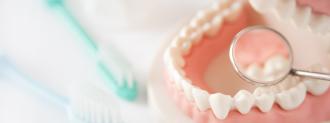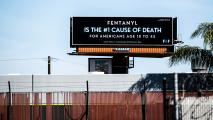In March, the American Dental Association (ADA) issued a recommendation in response to the COVID-19 pandemic, urging dentists to treat only patients in need of emergency services.
That recommendation expired on April 30, and there are now dentists reopening their offices all across the country.
But the COVID-19 pandemic still isn’t over — in fact, the number of daily new infections in the U.S. is currently higher than it was when the ADA first issued its recommendation.
So is it safe to go to the dentist right now? Or should you put off making an appointment for a little while longer?
Is It Safe to Go to the Dentist?
COVID-19 is typically transmitted person-to-person via respiratory droplets that enter the body through the nose or mouth.
Dentists and hygienists use tools that regularly spray droplets of saliva into the air from patients’ wide-open mouths — five minutes after that patient leaves, another might enter the room for the process to repeat.
Combine those two facts, and it’s pretty obvious why visiting a dental office might seem like a terrible idea right now.
However, many of the dentists reopening right now are going to great lengths to minimize the risk of infection for themselves, their staff, and their patients.
Ask your dentist what they’re doing in response to the coronavirus.
Pia MacDonald
Des Moines, Iowa, dentist Zachary Kouri told the Washington Post he installed new air purifiers in his office, bought reusable fabric gowns for his staff, and added a laundry room and changing room. He’s also spacing out his appointments to allow time for rooms to be decontaminated between patients.
ADA spokesperson Matthew Messina told CNN that many of the dentists reopening their offices are putting an emphasis on social distancing, asking patients to remain in their cars prior to their appointment times, rather than in waiting rooms.
Others are taking steps to ensure infected patients never enter dental offices in the first place, using phone questionnaires and temperature screenings to assess patients’ chances of having COVID-19 prior to treating them.
Before scheduling an appointment with your own dentist, Pia MacDonald, an infectious disease expert with RTI International, told Kaiser Health News that patients should call their dentists to ask what they’re doing in response to the coronavirus.
Weighing the Risks
Still, as long as the coronavirus exists, going into public is always going to increase your risk of infection to some extent — and dentists reopening their offices will still likely be working on patients using the same droplet-spraying tools they used before the pandemic.
To that end, you might want to consider the reason for your potential appointment — if you were due for your six-month cleaning in April, the health tradeoff of waiting an extra couple of months to avoid an increased COVID-19 risk might be worth it, according to RTI’s MacDonald.
“Just because you can be going back to the dentist doesn’t mean you should automatically go,” she said.
And if you need help deciding whether what’s going on in your mouth requires immediate medical attention or can wait, once again, the experts recommend reaching out to your dentist.
“If you have something in your mouth that you think is different, like a lump or bump, a white spot, a red spot, anything like that, don’t wait,” Messina said. “If there’s something that you’re not sure is right, that’s something you want to contact your dentist about.”
We’d love to hear from you! If you have a comment about this article or if you have a tip for a future Freethink story, please email us at tips@freethink.com.






